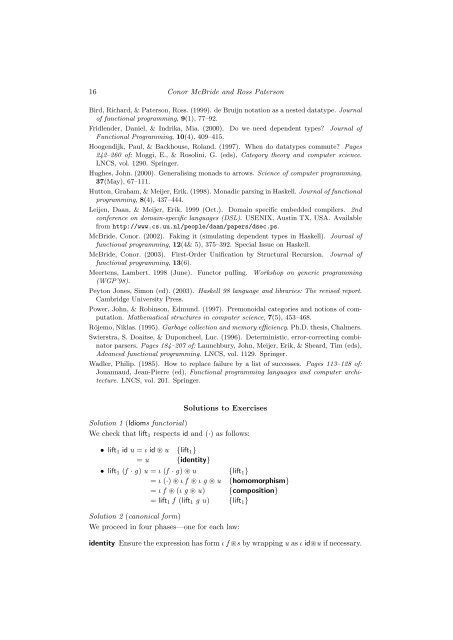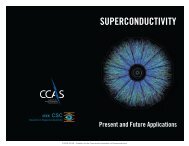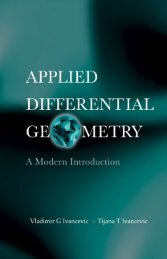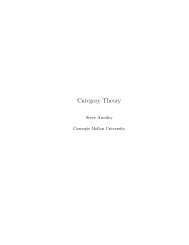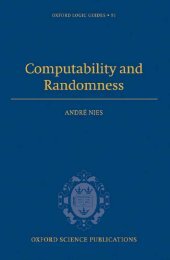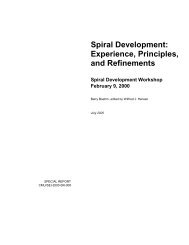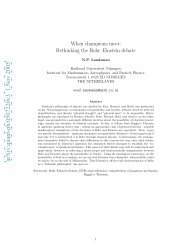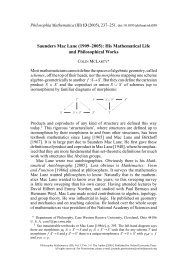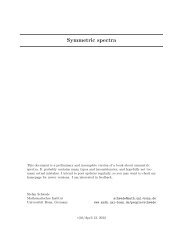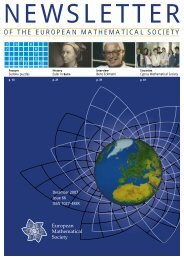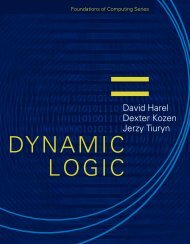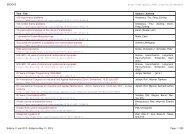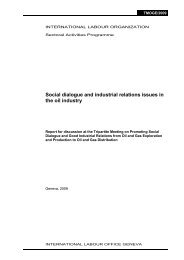Idiom
Idiom
Idiom
Create successful ePaper yourself
Turn your PDF publications into a flip-book with our unique Google optimized e-Paper software.
16 Conor McBride and Ross Paterson<br />
Bird, Richard, & Paterson, Ross. (1999). de Bruijn notation as a nested datatype. Journal<br />
of functional programming, 9(1), 77–92.<br />
Fridlender, Daniel, & Indrika, Mia. (2000). Do we need dependent types? Journal of<br />
Functional Programming, 10(4), 409–415.<br />
Hoogendijk, Paul, & Backhouse, Roland. (1997). When do datatypes commute? Pages<br />
242–260 of: Moggi, E., & Rosolini, G. (eds), Category theory and computer science.<br />
LNCS, vol. 1290. Springer.<br />
Hughes, John. (2000). Generalising monads to arrows. Science of computer programming,<br />
37(May), 67–111.<br />
Hutton, Graham, & Meijer, Erik. (1998). Monadic parsing in Haskell. Journal of functional<br />
programming, 8(4), 437–444.<br />
Leijen, Daan, & Meijer, Erik. 1999 (Oct.). Domain specific embedded compilers. 2nd<br />
conference on domain-specific languages (DSL). USENIX, Austin TX, USA. Available<br />
from http://www.cs.uu.nl/people/daan/papers/dsec.ps.<br />
McBride, Conor. (2002). Faking it (simulating dependent types in Haskell). Journal of<br />
functional programming, 12(4& 5), 375–392. Special Issue on Haskell.<br />
McBride, Conor. (2003). First-Order Unification by Structural Recursion. Journal of<br />
functional programming, 13(6).<br />
Meertens, Lambert. 1998 (June). Functor pulling. Workshop on generic programming<br />
(WGP’98).<br />
Peyton Jones, Simon (ed). (2003). Haskell 98 language and libraries: The revised report.<br />
Cambridge University Press.<br />
Power, John, & Robinson, Edmund. (1997). Premonoidal categories and notions of computation.<br />
Mathematical structures in computer science, 7(5), 453–468.<br />
Röjemo, Niklas. (1995). Garbage collection and memory efficiency. Ph.D. thesis, Chalmers.<br />
Swierstra, S. Doaitse, & Duponcheel, Luc. (1996). Deterministic, error-correcting combinator<br />
parsers. Pages 184–207 of: Launchbury, John, Meijer, Erik, & Sheard, Tim (eds),<br />
Advanced functional programming. LNCS, vol. 1129. Springer.<br />
Wadler, Philip. (1985). How to replace failure by a list of successes. Pages 113–128 of:<br />
Jouannaud, Jean-Pierre (ed), Functional programming languages and computer architecture.<br />
LNCS, vol. 201. Springer.<br />
Solutions to Exercises<br />
Solution 1 (<strong>Idiom</strong>s functorial)<br />
We check that lift1 respects id and (·) as follows:<br />
• lift1 id u = ι id ⊛ u {lift1}<br />
= u {identity}<br />
• lift1 (f · g) u = ι (f · g) ⊛ u {lift1}<br />
= ι (·) ⊛ ι f ⊛ ι g ⊛ u {homomorphism}<br />
= ι f ⊛ (ι g ⊛ u) {composition}<br />
= lift1 f (lift1 g u) {lift1}<br />
Solution 2 (canonical form)<br />
We proceed in four phases—one for each law:<br />
identity Ensure the expression has form ι f ⊛s by wrapping u as ι id⊛u if necessary.


